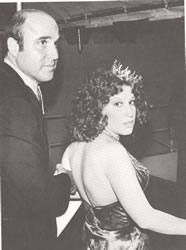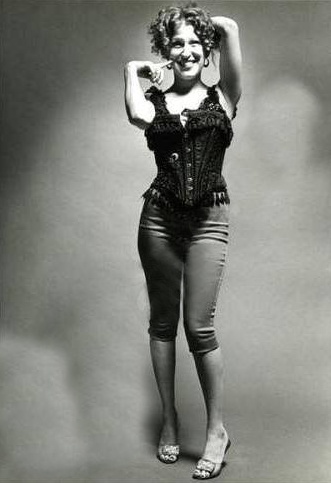
Mister D: I understand what Mr. Abbott is trying to say and believe me I have read worse since Ms. Jones Grammy sweep. Frankly, she may never win again, but she seemed like the type that might not really care. Some of the people he mentions that won big time out of the gate have had a long career since winning…he just left out, conveniently, some important information. No need to lessen the careers of Carole King and Roberta Flack…they both did quite well after the Grammys, thank you very much….BUT I loved his choices of those with presence…:-)
All those Grammys may be burdensome
Will Jones be the next big thing or another Christopher Cross?
Jim Abbott
The Orlando Sentinel
Saturday, March 01, 2003
When Norah Jones tours North America this summer — a tour that includes a stop at the Edmonton Folk Music Festival — she’ll still be basking in the glow of being the “Next Big Thing.”
That’s what happens when a relatively unknown 23-year-old of Indian and American lineage rises from obscurity to claim five Grammy Awards in a sweep of major categories.
The big question is what her status might be in five years.
Or, as Robin Williams joked on Sunday’s show, holding a grammophone trophy to his ear: “Oh, my God! Listen! It’s the sound of careers ending.”
Jones’ understated Come Away With Me was honoured as best album and best pop vocal album. She also won for best new artist and record of the year, and best female pop vocal performance for Don’t Know Why. The hit also won for best song for writer Jesse Harris.
IMPRESSIVE COMPANY
That dominance puts Jones up there with some of the biggest stars in popular music: Simon & Garfunkel (Bridge Over Troubled Water); Carole King (Tapestry); Carlos Santana (Supernatural); and Eric Clapton (Tears in Heaven).
Unfortunately, it also aligns her squarely with one of the most maligned winners in Grammy history: Christopher Cross.
That’s the coincidence that troubles Grammy expert Thomas O’Neil, author of The Grammys: The Ultimate Guide to Music’s Highest Honor.
“Norah Jones should pay attention to Christopher Cross,” O’Neil suggests, “because it’s scary.”
A singer-songwriter, Cross was the last performer to sweep the major awards and take best new artist, coming from nowhere in 1980 behind the popular momentum of innocuous pop ballads Sailing and Ride Like the Wind. Then he vanished, the music-business equivalent of Jimmy Hoffa. He has never been back on the charts, nor has he been invited back to the Grammys.
Cross didn’t want to be interviewed for this story, his manager noting that “he has been burned by these kinds of stories in the past.”
But O’Neil, who also handicaps award shows along with national journalists on the Goldderby.com Web site, is fascinated by the Cross-Jones connection. To him, there’s a series of coincidences that rivals that of President Kennedy’s secretary being named Lincoln and Lincoln’s secretary being named Kennedy.
Cross was a performer in Texas, which is where Jones was raised as the daughter of Indian sitarist Ravi Shankar and concert promoter Sue Jones. Cross and Jones also shared the status of long shot.
“I just didn’t think it was possible,” O’Neil says of the Jones sweep. “If there was anything as a Grammy shoo-in, Bruce Springsteen and The Rising was it. Not one Grammy pundit I know predicted it (Jones). Not one.”
SPOOKY SIMILARITIES
The similarities between Jones and Cross go beyond geography, which is where things start to become spooky.
The 1980 Grammy Awards were hailed as a triumphant celebration of New York. The ceremony was returning to the Big Apple from Los Angeles for the first time in five years. Hometown favourites Frank Sinatra and Barbra Streisand were expected to vie for album and record of the year. New York, New York was Sinatra’s nominated song.
“It was supposed to be the ultimate New York Grammy show,” O’Neil says. “Sinatra’s song was up for record of the year, and nobody thought it could possibly lose. Who’s going to say no to the Chairman of the Board.”
O’Neil saw Sunday’s upset as a repeat of the Sinatra scenario, with Springsteen entering as “an elder music statesman, one of the music lords expecting an overdue crown.”
There is already a quiet backlash in some circles about the outcome, O’Neil says, intensifying the pressure on Jones to justify the acclaim.
“There was widespread mumbling immediately after the sweep that she wasn’t worthy of it,” O’Neil says. “She faces the challenge of having to live up to her now-legendary award status. She doesn’t have to just stay on the scene and survive, she has to prove that she belongs in a pantheon with Simon and Garfunkel and the others.”
A historic Grammy performance also carries with it the weight of previous short-lived successes. The list of best new artist winners populates VH1’s Where Are They Now?: Sheena Easton, Marc Cohn, A Taste of Honey, Men At Work and Paula Cole.
Cole won the award in 1997, her only trophy for seven nominations. She stood at the podium and beamed at the person next to her: “This is my dream, getting this award from Aretha Franklin.”
Franklin also was at the podium Sunday, handing a trophy to Jones. While hopeful that Jones will fare better than Cole, Grammy expert O’Neil expects it will be a tough proposition.
“Carole King swept the top awards with Tapestry and You’ve Got a Friend and we’ve really not heard much from her again. There’s Olivia Newton John and even Roberta Flack, who you might be able to say came and went quickly.”
HEAVY LOAD?
As for Jones, she could carry the burden of her historic night for years to come.
“I think there’s a perception right now that she doesn’t seem worthy of it,” O’Neil says.
“She may very well prove to be, but she didn’t have the carriage or the aura of a major music star when she was swooping up those Grammys.
“You didn’t have the feeling you were in the presence of a Streisand, a Cher or a Bette Midler.”
That’s OK, as long as you don’t feel like you’re in the presence of a Christopher Cross.
© Copyright 2003 Edmonton Journal






